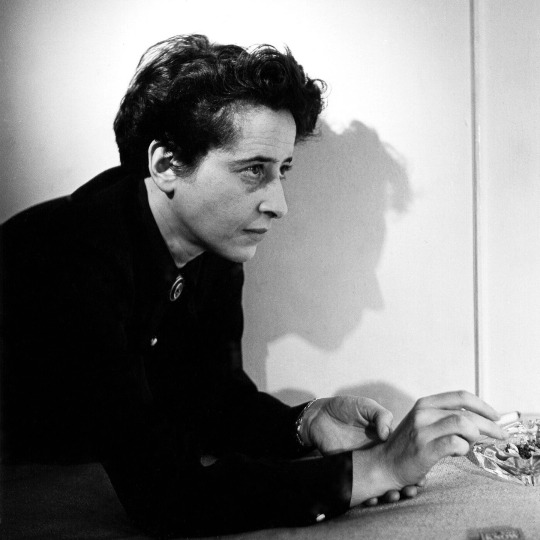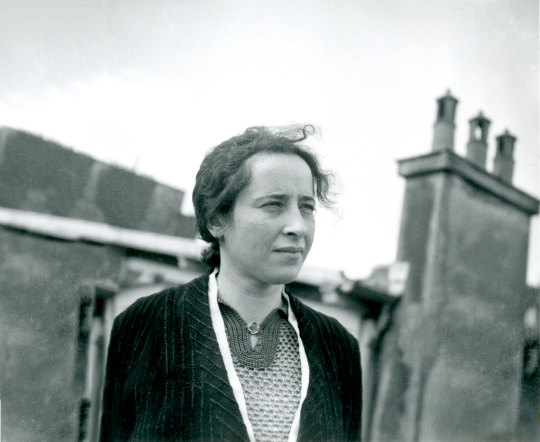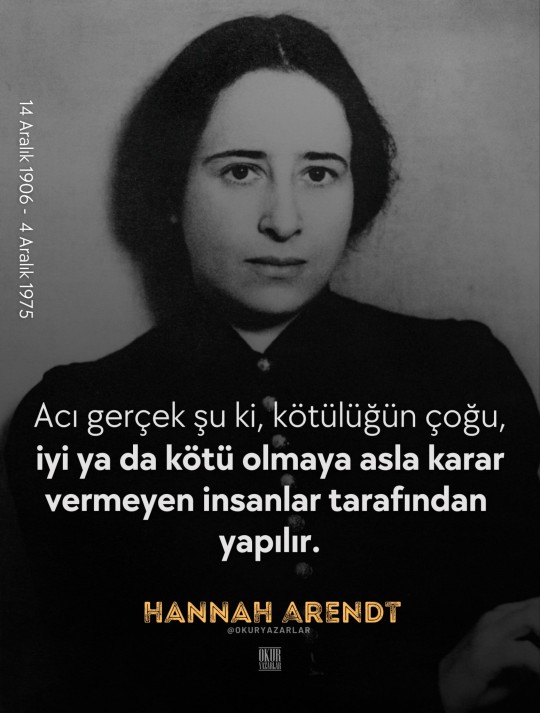#hannah arendt
Text
there are plenty of jewish intellectuals who were critical of israel and zionism who weren't virulently racist. please stop centering hannah 'savages of africa' arendt. she supported the apartheid in south africa. she also helped rehabilitate her former professor and notorious nazi collaborator philosopher heidegger.
942 notes
·
View notes
Quote
I'm more than ever of the opinion that a decent human existence is possible today only on the fringes of society, where one then runs the risk of starving or being stoned to death. In these circumstances, a sense of humor is a great help.
Hannah Arendt, Correspondence: 1926-1969
#philosophy#quotes#Hannah Arendt#Correspondence: 1926 1969#life#ethics#humanity#society#humor#laughter
574 notes
·
View notes
Text

“Loneliness is not solitude. Solitude requires being alone, whereas loneliness shows itself most sharply in company with others.”
— Hannah Arendt
#hannah arendt#literature#lit#literature lover#literature quote#literature quotes#philosophy#philosophical#philosopher#philosophers#philosophy quotes#philosophy of life#quote#quotes#excerpts#excerpt#quoteoftheday#booklover#book#bookworm#books#book quotes#book quotations#solitude
327 notes
·
View notes
Text
In nome degli interessi personali, molti rinunciano al pensiero critico, ingoiano insulti e sorridono a coloro che disprezzano. Anche smettere di pensare è un crimine.
Hannah Arendt
77 notes
·
View notes
Text
Where is the mind, Arendt asks, when it withdraws from the world of appearances? It is “Nowhere”: “Though known to us only in inseparable union with a body that is at home in the world of appearances by virtue of having arrived one day and knowing that one day it will depart, the invisible ego is, strictly speaking, Nowhere.” According to Arendt, to truly think, we have to step away from the world of appearance and retreat into ourselves. Once this retreat is effected, we can pull the idea for contemplation into our mind. We move into our mind and out of the body — and there, away from others, and, in a sense, away from ourselves, we can truly practise thinking.
Cynthia Cruz, Disquieting: Essays on Silence
60 notes
·
View notes
Text

Hannah Arendt, October 14, 1906 – December 4, 1975.
135 notes
·
View notes
Note
Whats your personal opinion on originals and fics that center Nazis? Even if they keep the horrible people that they are, do you think its... ethical? For the lack of the better word. Because it seems like a very hard topic to navigate, even if all characters are fictional therfore not responsible for actual atrocities.
My short answer is: yes (and there is nothing that could make me say otherwise.) But I can tell, Anon, that this is a question made thoughtfully and in good faith, one that exists in implicit conversation with Simone Weil's exhortation about not reacting to evil in a way that would increase it. So! I will provide a longer answer as well, and it's one I've spent some time meditating on.
Whatever you mean by "it" (Nazis, fascism, genocide), yes, it is a hard topic to navigate, intellectually and emotionally. In my view, this is an argument for approaching hard topics in fiction, not an argument against it. There are a number of factors influencing my position. For one thing, I'm against censorship. Living through the rise (again) of fascism in our own historical moment has strengthened my views on this. Moreover, the argument that maybe it would be better not to present "horrible" things/people or "hard topics" in fiction has been successfully used against queer fiction (and, not incidentally, public libraries) in the region where I live. As a queer woman, I find this both enraging and frightening.
Also, there's precedent for this. People asked themselves this question about Nazis in the time of Nazis. Charlie Chaplin made the controversial comedy The Great Dictator because he wanted to show the absurdity of Hitler's self-delusion, and represent the grandiose plans of Europe's dictators (plural) as, quite literally, ridiculous. Conrad Veidt, having fled the Nazis, drew a personal boundary: he said he would play as many Nazis as Hollywood wanted him (6'2", German accent, cheekbones that could cut glass) to play, as long as their ideology was always represented as absolutely, irredeemably hollow/evil. Obviously (Casablanca) this did not prevent him from playing Nazis as chillingly plausible, complex human beings.
There's also the complex question of what counts as "centering," to say nothing of the question of who counts as a Nazi. (Briefly on the latter: anyone who ever had an NSDAP card? anyone conscripted into the army? If the answer to the former question is "yes," this would include Hans Fallada's novel Jeder stirbt für sich allein, where a couple who voted for Hitler become anti-Nazi activists after their only son is killed on the front. If the answer to the latter is "yes," it would group together men with wildly differing, even diametrically opposed political and moral convictions.) Paul Verhoven's Zwartboek has central characters who are Nazis, and confronts the grotesque, abusive violence of the regime unflinchingly. Schindler's List forces its audiences to confront the reality of a damaged sensualist who will shoot other human beings and like it. More recently, Timur Vermes' novel Er ist wieder da imagined (presciently, alas) how the news cycle and celebrity culture of the 21st century would react to an outrageous dictator. I think that fiction, including films and, yes, including fanfic, can do the work of teaching what Hannah Arendt, in Eichmann in Jerusalem, called "the lesson of the fearsome, word-and-thought-defying banality of evil."
#asks and answers#books#reading#nazism cw#fascism#possibly this ask is about#the zone of interest#but i have not read this#hannah arendt
90 notes
·
View notes
Text
It has frequently been observed that terror can rule absolutely only over men who are isolated against each other and that, therefore, one of the primary concerns of all tyrannical government is to bring this isolation about. Isolation may be the beginning of terror; it certainly is its most fertile ground; it always is its result. This isolation is, as it were, pretotalitarian; its hallmark is impotence insofar as power always comes from men acting together, "acting in concert" (Burke) ; isolated men are powerless by definition.
Hannah Arendt, The Origins of Totalitarianism
#hannah arendt#the origins of totalitarianism#quotes#Been chewing on this book lately for a paper -- breaking down the connection between#americans & american culture testimonies as feeling more isolated than ever and the ever present rise of#far right movements & propaganda and anyways!#lots to think about#reading 2023
270 notes
·
View notes
Text
Good can be radical; evil can never be radical, it can only be extreme, for it possesses neither depth nor any demonic dimension yet--and this is its horror--it can spread like a fungus over the surface of the earth and lay waste the entire world. Evil comes from a failure to think. It defies thought for as soon as thought tries to engage itself with evil and examine the premises and principles from which it originates, it is frustrated because it finds nothing there. That is the banality of evil.
Hannah Arendt, Eichmann in Jerusalem: A Report on the Banality of Evil, January 1, 1963
#hannah arendt#banality of evil#literary text#quotes#books and libraries#dark acadamia aesthetic#evil#depth#good and evil#dark academia#spilled ink#german literature
801 notes
·
View notes
Quote
Clichés, stock phrases, adherence to conventional, standardized codes of expression and conduct have the socially recognized function of protecting us against reality.
Hannah Arendt, The Life of the Mind
167 notes
·
View notes
Text

Thomas Hirschhorn with Marcus Steinweg, Hannah Arendt-Map, 2003 [The Cranford Collection, London. © Thomas Hirschhorn, Marcus Steinweg]
#art#drawing#visual writing#collage#cardboard#mixed media#map#thomas hirschhorn#marcus steinweg#hannah arendt#cranford collection#2000s
88 notes
·
View notes
Quote
Storytelling reveals meaning without committing the error of defining it.
Hannah Arendt
210 notes
·
View notes
Text
Tea Time Emotiku
Monday, 01/09/2023, Fear
Day opens with fire / your heart then burns with desire / I fear he’ll say, “No.” © keefderpoet 2023

“Fear is an emotion indispensable for survival.” Hannah Arendt
Fear sometimes gets a bad rap, but it is a healthy emotional response to danger. We need to learn to listen to our fears and ask, “Is this real or imagined.” Mediocrity is the child of too many safe choices. I know. Don’t ask me how I know. Just know; I know.
265 notes
·
View notes
Text

Haklara sahip olma hakkı kuramı insan haklarının temellendirilmesinde önemli ölçüde kabul gören, 20. yüzyıl siyaset ve hukuk felsefesinde düşünce yaşamına damgasını vurmuş düşünür, siyaset bilimci ve yazar Hannah Arendt'i aramızdan ayrılışının 48. yılında saygıyla anıyoruz.
36 notes
·
View notes
Text
Love, by its very nature, is unworldly, and it is for that reason, rather than its rarity, that it is not only apolitical but anti-political, perhaps the most powerful of all anti-political human forces.
Hannah Arendt
27 notes
·
View notes
